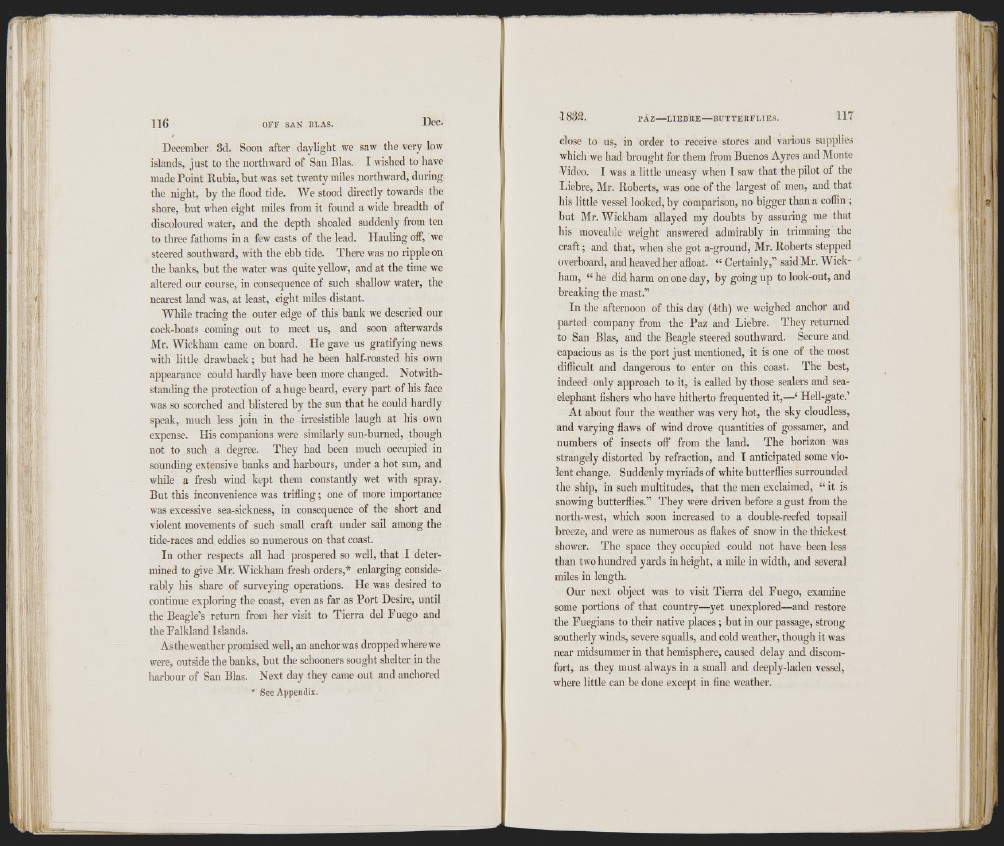
, í I
t' t
7 i
• ;
.
7-7
ilíí
F
' M ■
r ¡
li,I
7
;7
116 OFF SAN BLAS. Dec.
December 3d. Soon after daylight we saw the very low
islands, just to the northward of San Bias. I wished to have
made Point Rubia, but was set twenty miles northward, during
the night, by the flood tide. We stood directly towards the
shore, but when eight miles from it found a wide breadth of
discoloured water, and the depth shoaled suddenly from ten
to three fathoms in a few casts of the lead. Hauling off, we
steered southward, with the ebb tide. There was no ripple on
the banks, but the water was quite yellow, and at the time we
altered our course, in consequence of such shallow water, the
nearest land was, at least, eight miles distant.
AVhile tracing the outer edge of this bank we descried our
cock-boats coming out to meet us, and soon afterwards
Mr. AVickham came on board. He gave us gratifying news
with little drawback; but had he been half-roasted his own
appearance could hardly have been more changed. Notwithstanding
the protection of a huge heard, every part of his face
was so scorched and blistered by the sun that he could hardly
speak, much less join in the irresistible laugh at his own
expense. His companions were similarly sun-burned, though
not to such a degree. They had been much occupied in
sounding extensive banks and harbours, under a hot sun, and
while a fresh wind kept them constantly wet with spray.
But this inconvenience was trifling; one of more importance
was excessive sea-sickness, in consequence of the short and
violent movements of such small craft under sail among the
tide-races and eddies so numerous on that coast.
In other respects all had prospered so well, that I determined
to give Mr. AA^'ickham fresh orders,* enlarging considerably
his share of surveying operations. He was desired to
continue exploring the coast, even as far as Port Desire, until
the Beagle’s return from her visit to Tierra del Puego and
the Falkland Islands.
Astheweather promised well, an anchorwas dropped where we
were, outside the banks, but the schooners sought shelter in the
harbour of San Bias. Next day they came out and anchored
* See Appendix.
1832. PAZ L IEB R E BUTTERFLIES. 117
close to us, in order to receive stores and various su ¡¡plies
which we had brought for them from Buenos Ayres and Monte
Video. I was a little uneasy when I saw that the pilot of the
Liebre, Mr. Roberts, was one of the largest of men, and that
his little vessel looked, by comparison, no bigger than a coffin ;
but Mr. AVickham allayed my doubts by assuring me that
his moveable weight answered admirably in trimming the
craft; and that, when she got a-ground, Mr. Roberts stepped
overboard, and heaved her afloat. “ Certainly,” said Mr. AVickham,
“ he did harm on one day, by going up to look-out, and
breaking the mast.”
In the afternoon of this day (4th) we weighed anchor and
parted company from the Paz and Liebre. They returned
to San Bias, and the Beagle steered southward. Secure and
capacious as is the port just mentioned, it is one of the most
difficult and dangerous to enter on this coast. The best,
indeed only approach to it, is called by those sealers and sea-
elephant fishers who have hitherto frequented it,—‘ HeU-gate.’
At about four the weather was very hot, the sky cloudless,
and varying flaws of wind drove quantities of gossamer, and
numbers of insects off from the land. The horizon was
strangely distorted by refraction, and 1 anticipated some violent
change. Suddenly myriads of white butterflies surrounded
the ship, in such multitudes, that the men exclaimed, “ it is
snowing butterflies.” They were driven before a gust from the
north-west, which soon increased to a double-reefed topsail
breeze, and were as numerous as flakes of snow in the thickest
shower. The space they occupied could not have been less
than two hundred yards in height, a mile in width, and several
miles in length.
Our next object was to visit Tierra del Fuego, examine
some portions of that country—yet unexplored—and restore
the Fuegians to their native places ; but in our passage, strong
southerly winds, severe squalls, and cold weather, though it was
near midsummer in that hemisphere, caused delay and discomfort,
as they must always in a small and deeply-laden vessel,
where little can be done except in fine weather.
Mj